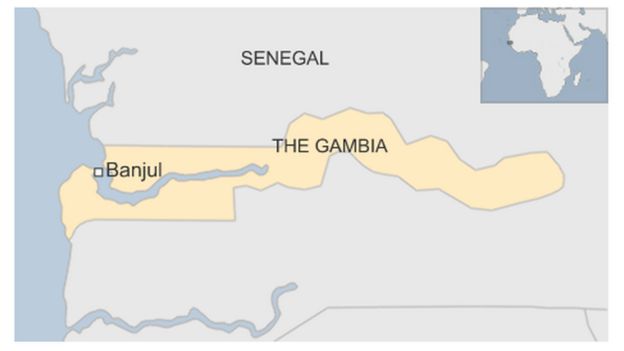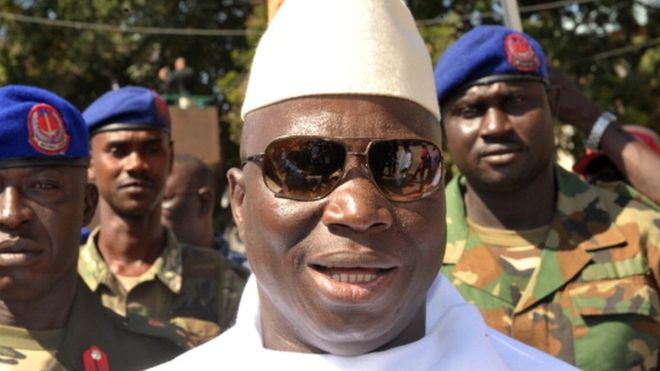
The Gambia’s parliament has extended President Yahya Jammeh’s term, which is due to end on Thursday following his defeat in elections, by 90 days.
It also approved his decision to declare a 90-day state of emergency.
Senegalese troops have reportedly moved towards The Gambian border ahead of possible intervention to force Mr Jammeh to hand power to President-elect Adama Barrow.
Thousands of UK and Dutch tourists are being evacuated from The Gambia.
The tiny West African state is popular with European holidaymakers because of its beaches.
Africa Live: Updates on this and other stories
What happens next?
Adama Barrow: From estate agent to president
Holidaymakers to be returned
The Gambia was plunged into crisis after Mr Jammeh rejected Mr Barrow’s shock victory in the 1 December election.
 Image copyrightREUTERS
Image copyrightREUTERSIn a televised announcement on Tuesday, Mr Jammeh said “any acts of disobedience to the laws of The Gambia, incitement of violence and acts intended to disturb public order and peace” were banned under the state of emergency.
He said security forces were instructed to “maintain absolute peace, law and order”.
Could there be conflict?
A Senegalese military source said they were “very seriously” preparing for military action in The Gambia, Reuters news agency reports.
Residents in two towns in southern Senegal told the agency they had seen columns of troops heading for the border.
Regional bloc Ecowas, the Economic Community of West African States, has mandated Senegal, which almost surrounds The Gambia, to spearhead military intervention, but only as a last resort and with the backing of the UN Security Council.

The US State Department urged Mr Jammeh to peacefully transfer power to Mr Barrow on Thursday.
“Doing so would allow him to leave office with his head held high and to protect The Gambian people from potential chaos,” spokesman John Kirby said.
“Failure to do so will put his legacy, and more importantly The Gambia, in peril,” he added.
The Gambia’s entire armed forces is made up of only about 2,500 troops, making it difficult to see how they can defeat a regional force if it moves in, says BBC Africa Monitoring security correspondent Tomi Oladipo.
Nigeria’s air force was contributing 200 “supporting” troops for the force, navy spokesman Capt Dahun Jahun told the Associated Press.
A Nigerian military source told our correspondent that a Nigerian warship was sailing towards The Gambia as a show of force.
However, Nigerian President Muhammadu Buhari’s foreign affairs aide, Abike Dabiri-Erewa, denied it was a war ship, saying a vessel had been sent to evacuate Nigerians if need be.
Where is Mr Barrow?
Mr Barrow, a property developer, has been in Senegal since Saturday. His aides said he would return to The Gambia for his inauguration on Thursday.
In his only comment since the state of emergency was declared, he tweeted: “We made history on the first day of December. Our future starts tomorrow.”
 Image copyrightAFP
Image copyrightAFPMr Jammeh’s declaration of a state of emergency was seen as an attempt to block the ceremony, scheduled to take place at a stadium in Bakau town, west of the capital Banjul, from going ahead.
Mr Barrow could, technically, also be sworn in at The Gambian embassy in Senegal. However, there are currently no visible preparations under way there.
Could there be a refugee crisis?
At least 26,000 Gambians, mostly women and children, had crossed into Senegal by Monday evening amid fears that violence could erupt, the UN refugee agency said, citing Senegalese government figures.
“The flow has increased sharply since then,” regional spokeswoman Helene Caux was quoted by Reuters as saying.
Travel firm Thomas Cook said it would fly back to the UK, over the next 48 hours, 985 customers from package holidays after the Foreign Office advised “against all but essential travel to The Gambia due to ongoing political uncertainty and potential military intervention following the presidential elections”.
 Image copyrightTHINKSTOCK
Image copyrightTHINKSTOCKAbout 1,600 Dutch citizens are also being flown home after similar advice from their government.
Tourism has become the fastest-growing sector of The Gambia’s economy, and the country, which has a population of about two million, was marketed to holidaymakers as “the smiling coast of West Africa”.
But many of its citizens are poor and complain of political repression. Some, including the goalkeeper of the national women’s football team, have drowned in the Mediterranean trying to reach Europe in the hope of a better life.
Why is Mr Jammeh refusing to leave office?
He has ruled The Gambia since taking power in a bloodless coup in 1994.
The Gambia regularly held elections, which he won until his shock defeat in the latest poll.
Mr Jammeh has said there were irregularities in the election process, including the turning away of some of his supporters from polling stations, and errors made by the electoral commission.
[Source:-BBC]



